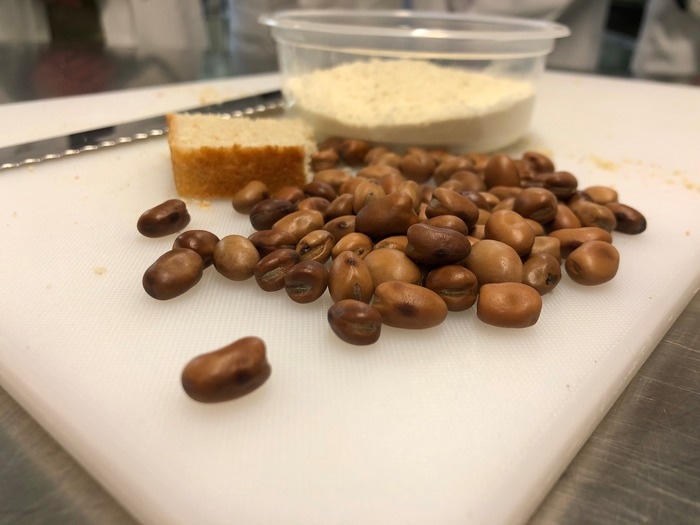The faba bean genome, which has been sequenced for the first time and published in Nature on March 8th, 2023, is more than four times as large as the human genome at 13 billion bases. This is a remarkable technological accomplishment that is essential to initiatives to breed beans with the optimum nutritional value and production sustainability.
 Faba beans (dried) with faba bean flour and bread fortified with faba bean. Image Credit: University of Reading
Faba beans (dried) with faba bean flour and bread fortified with faba bean. Image Credit: University of Reading
This extensive sequencing study was carried out by a group of researchers from Europe and Australia, led by the Universities of Reading (UK), Aarhus (Denmark), and Helsinki (Finland).
The endeavor is to fully decode the genome and then put its applicability to the test by looking for genes related to seed size. The scientists also looked at the hilum’s color to see if they could identify the genes responsible for this distinguishing trait. The hilum is the scar left behind after a bean separates from its pod.
The University of Reading team was led by Professor Donal O’Sullivan.
Having shown that we can quickly pinpoint genes controlling these visible seed traits, work is already underway to locate and identify precise genetic differences that control hidden seed characteristics that determine its nutritional value.”
Donal O’Sullivan, Professor, Crop Science, University of Reading
He added, “We want to produce beans that are higher in essential amino acids as well as lower in antinutrients, such as phytate, which binds micronutrients and reduces absorption. Having the genome sequence will accelerate this process considerably.”
The University of Reading is embarking on an endeavor to promote the consumption of UK-grown pulses by integrating faba bean flour into the perennially famous British white loaf. The improved chances for nutritional improvement are fueling this study.
The “Raising the Pulse” project, which is a part of the publicly funded UKRI Transforming UK Food Systems initiative, will gain an advantage from what is effectively now a genetic toolkit for breeding lines with advantageous features.
Faba beans naturally have significant levels of iron, protein, and fiber, all of which are nutrients that many people in the UK could need more of. While they thrive in the UK, they are mostly given to animals to produce milk and meat.
Going straight to the protein source—the ordinary faba bean—makes sense at a time when plant-based diets are a desirable option for those who want to protect the environment and their own health.
Source:
Journal reference:
Jayakodi, M., et al. (2023). The giant diploid faba genome unlocks variation in a global protein crop. Nature. doi.org/10.1038/s41586-023-05791-5